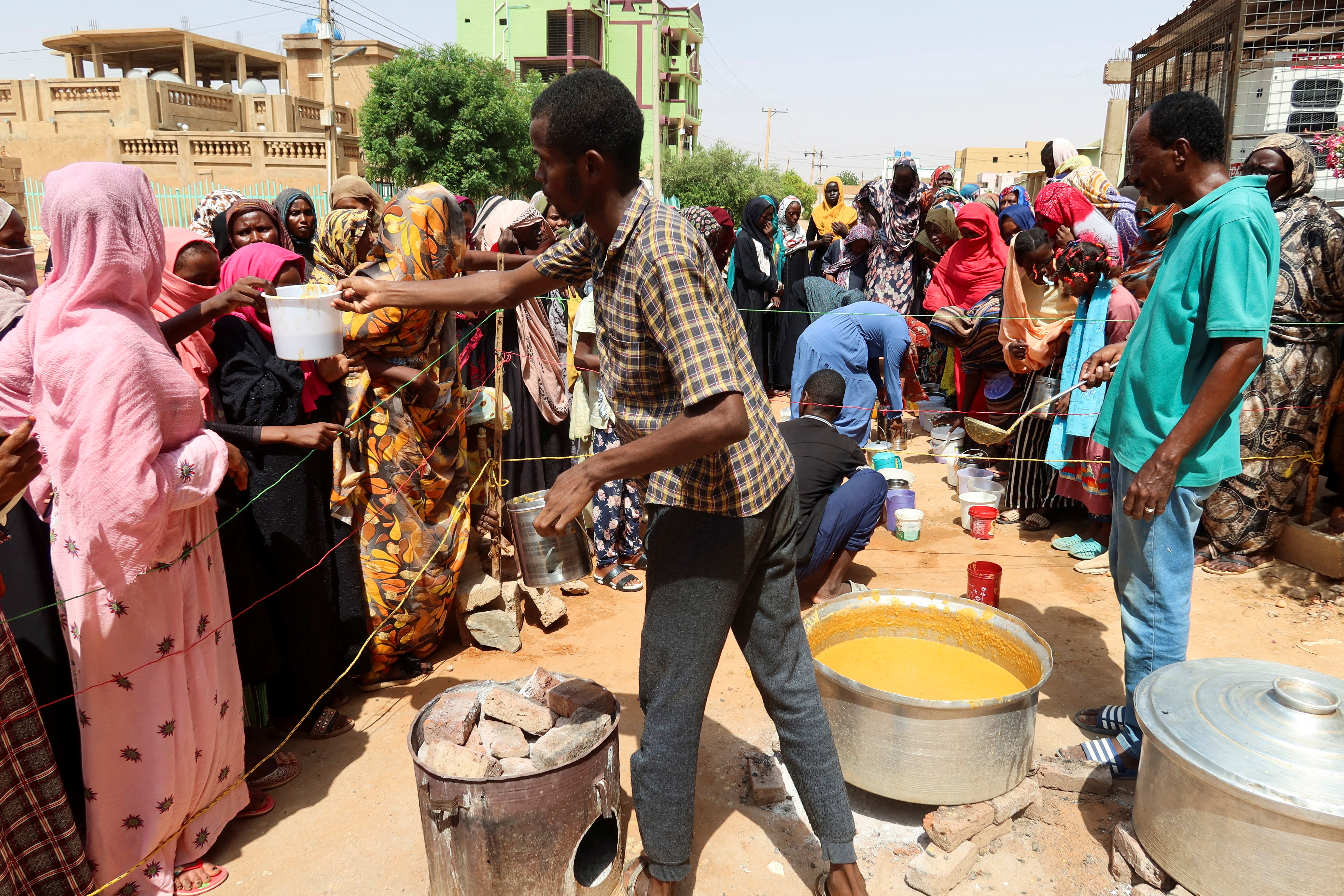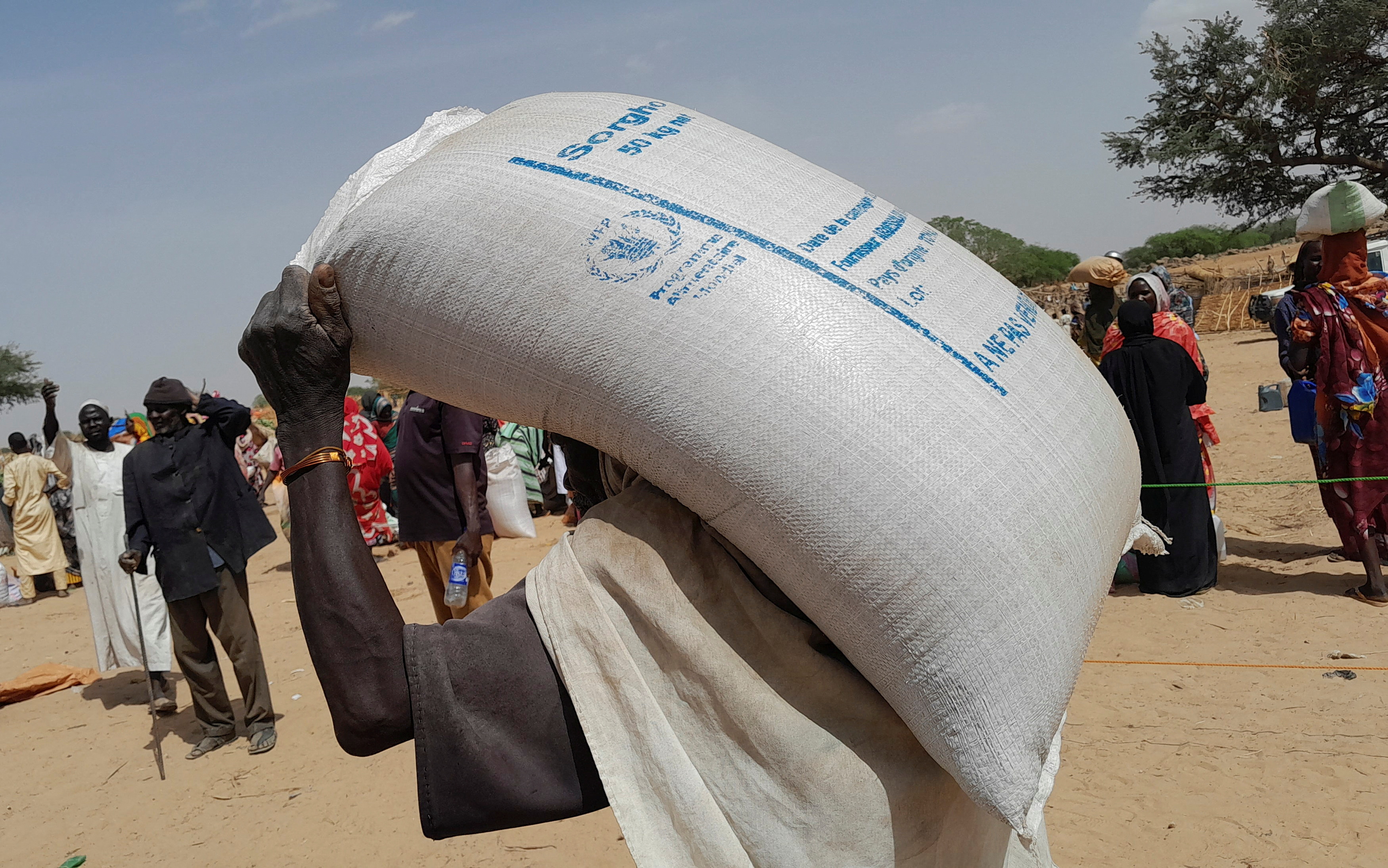
In September, Soulayma Abdel Hay started a soup kitchen in Sudan’s capital Khartoum. She solicited overseas donations to buy rice, beans and eggs and to cook for hungry families three times a week.
Khartoum had mostly fallen to the paramilitary Rapid Support Forces (RSP), who looted the property and savings of hundreds of thousands of people. In Abdel Hay’s neighbourhood, many Sudanese fell into poverty and relied on her meals to survive.
“When we started, about 70 people would come to us for food … from several neighbourhoods,” Abdel Hay told Al Jazeera from Khartoum. “Eventually, we started to see more than 200 people coming each time we cooked.”
Ten months into Sudan’s civil war between the RSF and the Sudanese army, the country is facing acute hunger, aid groups and famine experts told Al Jazeera.
The United Nations estimates that about 18 million people are facing emergency levels of hunger – double the figure from last year. A recent internet blackout across the country compounded the crisis by suspending money transfers, which the diaspora relies on to support loved ones in the country.
As famine looms, aid agencies are calling for $4.1bn in funding to avert a catastrophe in Sudan and countries hosting Sudanese refugees.
“Even if [hunger levels stay where they are], hundreds of thousands of children will die by next year,” said Alex de Waal, an expert on famines and the executive director of the World Peace Foundation at the Fletcher School of Law and Diplomacy at Tufts University.
“That’s what a year-long [food] emergency for millions of people will cause,” he told Al Jazeera.
Dying of Hunger
Malnourishment is already affecting millions of people in Darfur, according to Doctors without Borders (Medecins sans Frontieres or MSF in French). On February 5, the aid group declared that hunger kills two children every hour in the Zamzam displacement camp in North Darfur.
Zamzam was established during Darfur’s first major civil war in 2003, where government-backed militias from nomadic “Arab” tribes fought against mostly “non-Arab” sedentary groups. Before the current war, the camp was home to about 400,000 people.
Emmanuel Berbain, an MSF medical team leader, said civilians in Darfur have suffered from rising levels of hunger after many UN agencies and global relief groups terminated operations in the region at the start of the war due to lawlessness and insecurity.

Amid that shortfall, thousands of people fleeing recent violence in South and Central Darfur have sought refuge in Zamzam, Berbain, who recently visited the camp, said.
“Civilians in Darfur have been left with nothing,” Berbain told Al Jazeera.
“Many people have also not been able to harvest their crops due to displacement or after their land was ravaged [due to the war],” he added.
Water-borne diseases are also causing extreme levels of malnourishment across the country, especially among children. In December, the UN Office for the Coordination of Humanitarian Affairs (OCHA), declared a cholera outbreak in Gadarif, a state in the far east.
Berbain said that Darfur is likely dealing with a similar or even worse crisis.
“Children suffering from diarrhoea [brought on by cholera] for weeks and weeks will suffer extreme malnutrition. That’s why water and sanitation is one of the key drivers of the crisis,” he told Al Jazeera.
A Deliberate Crisis
Sudan is running out of time to mitigate a food crisis exacerbated by the conflict, according to a recent policy brief by the Clingendael Institute, a think tank in the Netherlands. The report found that the war has acutely affected food availability and people’s ability to buy it.
In West Darfur, the RSF and allied militias conducted an ethnic cleansing campaign – possibly genocide – by driving “non-Arab” communities from their land.
The RSF has also systematically looted aid warehouses, banks, cars, homes and jewellery from across the country while, to make matters worse, the army is restricting aid to regions under RSF control and cracking down on grassroots initiatives trying to feed their communities.
“By … preventing people from accessing food, the [army] and RSF may be perpetrating starvation crimes,” stated the Clingendael report. “What is clear is that both generals show every sign of intensifying the war with reckless disregard for the humanitarian consequences.”
Grassroots aid
Experts and Sudanese activists say Western states and UN agencies should streamline funding to Emergency Response Rooms (ERRs), grassroots committees that are supporting hundreds of soup kitchens across the country.
In Khartoum alone, the ERR is divided into seven districts and they split their funding – raised from remittances and donations – to activists running soup kitchens in their respective areas.

Some soup kitchens feed hundreds of people daily, while others feed people about three or four times a week, according to Hajooj Kuka, the spokesperson for the Khartoum ERR.
“The kitchens are divided into small, medium and large. Large kitchens produce food for between 100 or 150 families… the small ones serve about 40 and the medium ones around 80,” he told Al Jazeera.
“There are many people that eat at these kitchens every day because that’s their main or only source of food,” he added.
Despite the vital role that ERRs play in feeding their communities, the global community is failing to support them. De Waal said Western donors are hesitant to directly finance ERRs because they will struggle to trace how each dollar is spent.
He added that the global community willingly cooperates with the Humanitarian Aid Commission (HAC), which many experts and aid agencies believe is a front for military intelligence.
Al Jazeera previously uncovered how HAC controls, profiteers, diverts and confiscates aid in areas under the army’s control, according to multiple aid groups, experts and activists
“ERRs are people who are accountable to their communities,” De Waal told Al Jazeera. “Would [the global community] rather deal with them or with HAC, which is an arm of the [security forces] and whose very purpose is to steal aid?






